By: Izumi Hasegawa November 10, 2022
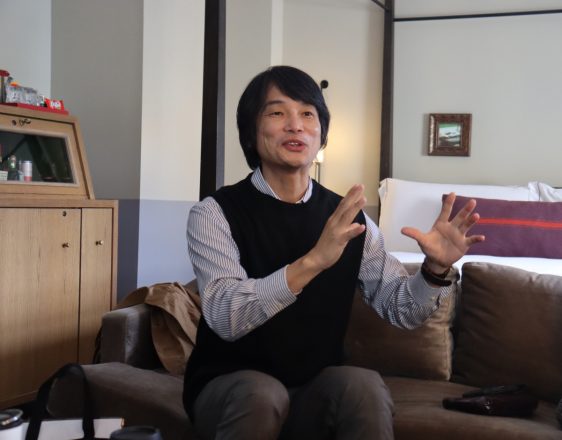
Oni: Thunder God’s Tale is a Netflix animation series from Tonko House based on traditional Japanese culture and folklore. The series is directed by Daisuke “Dice” Tsutsumi, the co-founder of Tonkin House. I interviewed Tsutsumi on how the idea for the film came about and what he particularly focused on.
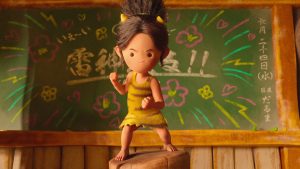
© 2022 Netflix, Inc.
Q: How did this film come about?
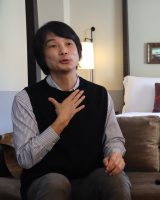
Photo by Mina Nobuhara / Hollywood News Wire Inc.
I have lived in the U.S. for about 30 years, and during that time, as a Japanese person in the film industry, I have become acutely aware of the limited opportunities for representation of Japanese culture by Japanese people. Because of this, I’ve always wanted to be involved in a project that dealt with Japanese culture. When I was selected as a director, my first thought was to do something with Japanese folklore.
In the old Japanese stories, the “oni” are always depicted as evil. However, some theories claim that the word oni may have been used as a word for other people, like the indigenous people of Japan or foreigners, who looked different from the Japanese people who created and enjoyed the folklore. When the fear of the unknown, the “other”, gets out of control, it takes the form of evil enemies and becomes the subject of punishment. This idea has always fascinated me as it is no different from the world we are living in now.
Although folklore was created hundreds of years ago, it is still very relatable. I felt the urge to express this concept in this modern society, and that’s how the story of Oni: Thunder God’s Tale started. When I first moved to the U.S., I experienced the fear of being a stranger in American culture, surrounded by unknown people. I could also feel the similar fear others felt toward me. My 10-year-old son is now growing up as a Japanese-American. He will probably face mental conflict about where he belongs, and I hope that by producing this film, I can inspire him to see that it is alright to be who he is.
Q: Because many members of your crew were Japanese citizens, did they have any interesting perspectives compared to you, who has lived abroad and seen Japan from the outside?
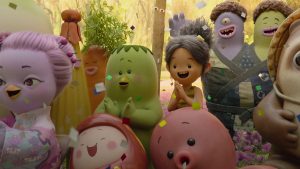
© 2022 Netflix, Inc.
Interestingly, what started out as a personal concept based on my long experience of being a foreigner connected to the idea of demons, turned out that everyone had had a similar experience. When we started planning this film, we brought in a producer who was my colleague at Pixar. I told her about the concept, and she said it was very relatable. When she came to San Francisco from Kentucky, she had also experienced the sense of being a pariah. The Japanese staff shared similar experiences of coming from the countryside to a university in Tokyo and feeling different from everyone else in the classroom, even within the same country. We were able to share a similar perspective on the concept. Besides the superficial conflicts of being a foreigner, an oni, a human, or a yokai, I think everyone has the experience of being torn between their ideal and true selves.
Q: I am also a Shinto priest. I was moved by the opening line, “we are the Kami, great spirits of the natural world.” We Japanese have felt the presence of the gods in nature since ancient times and have conveyed respect and gratitude to them. And the “Kushi” that Onari and the others are training to achieve refers to the Kushi-mitama, right? (Kushi-mitama: souls with mystical powers)
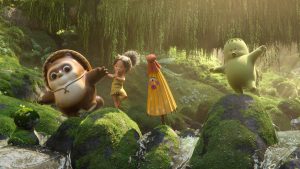
© 2022 Netflix, Inc.
Actually, I did not know the word Kushi. We invited a historical consultant for our project, and I composed the story using various words I learned from them, one of them being the power of Kushi.
Q: I am very happy that the production was trying to convey traditional Japanese culture as accurately as possible, such as the Shide on Shimenawa (sacred straw ropes). Please tell us about the points you paid special attention to.
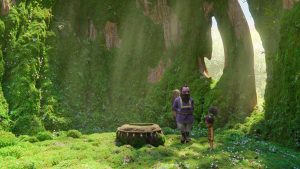
© 2022 Netflix, Inc.
I really cared about making this film in English. I asked my favorite scriptwriter Mari Okada to write the first script in Japanese, but I created the final script in English. The production was done almost entirely in English with staff from different countries. I consider it an essential aspect of this film. I wanted to make something that would not tarnish Japanese culture while striking a balance so that people outside of Japan would also understand it. So I carefully worked on that with specialists who helped me with Japanese culture. For example, when Onari gets her bento from Naridon at school, she first uses the word “lunch” and then starts using the word “bento”. This tells the viewer that “bento” means lunch. I was particular about the words in the film, partially because I wanted the viewers to learn some Japanese words.
Q: I am pleased you decided to use Japanese and Japanese American voice actors. I have seen Mexican, Chinese, Korean, and other people reach out to their fellow countrymen to help each other climb up the ladder with them after they got attention from the Academy Awards ® or other awards. It always bothered and disappointed me that there were never any Japanese people who did this. So I was proud to see many Japanese names enter the end credits. I believe it will surely be an encouragement to the younger generation. I think this film required the delicate sense of the Japanese. Did using Japanese and Japanese-American voice actors help you proceed with the production as a director?
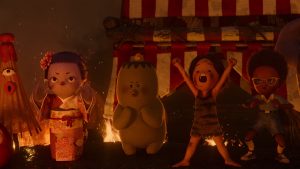
© 2022 Netflix, Inc.
That was definitely a point I really cared about. Many Japanese words appear in the English version, so I wanted to ensure that the pronunciation was Japanese. In the initial casting stage, we tried to use voice actors who were Japanese or of Japanese descent, understood Japanese culture, and were interested in the Japanese language. We were able to hire quite a few of those actors. One part that worked out well because of this was the dance scene, which plays a central role in the story — “dontsukotsukotsuko, wasshoi wasshoi.” The pronunciation is especially difficult for non-Japanese speakers. That is why I asked the cast members who can speak Japanese to lead the part. I believe it would have been challenging without the Japanese actors.
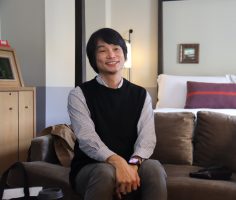
Photo by Mina Nobuhara / Hollywood News Wire Inc.
Q: The music reminded me of Joe Hisaishi (Japanese composer, known for his music in Studio Ghibli movies), having the power to illuminate the picture and drive emotions. It was as if the music itself came alive as a character. What kind of direction did you give to the music?
The music was composed by Zach Johnston and Matteo Roberts, two composers who have worked with us in almost every film the Tonko House have made.
Film music composers usually come on board in the final stages of production and apply the music to the images. However, we started communicating with them even before the script for Oni: Thunder God’s Tale was written. Some of the scenes even had music written first, and then the story was set to the music. They are truly wonderful musicians. Being aware of the central cultural these of this project, they were very respectful of it, and studied a great deal about Japan, including traditional Japanese music. They composed the music by balancing the Japanese essence and their unique pop sound. Their music was a great source of inspiration to me in this project.
Q: Your wife Mei is the niece of Hayao Miyazaki from Studio Ghibli, a senior in the animation industry. Did Miyazaki introduce you to your wife?
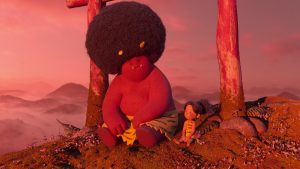
© 2022 Netflix, Inc.
My wife and I were classmates in the first grade of elementary school. So I knew her before I saw any of Hayao Miyazaki’s films, long before “My Neighbor Totoro” was released. (His wife is said to be the model for Mei in “My Neighbor Totoro”) What is more, she was my first love. She didn’t seem to have affection for me back then, but my feelings for her bore fruit decades later. I learned she was related to Hayao Miyazaki after I grew up.
Oni: Thunder God’s Tale, Now Available on Netflix
Interview English Translated by Mina Nobuhara / Hollywood News Wire Inc., Hana Umemoto / Hollywood News Wire Inc.
